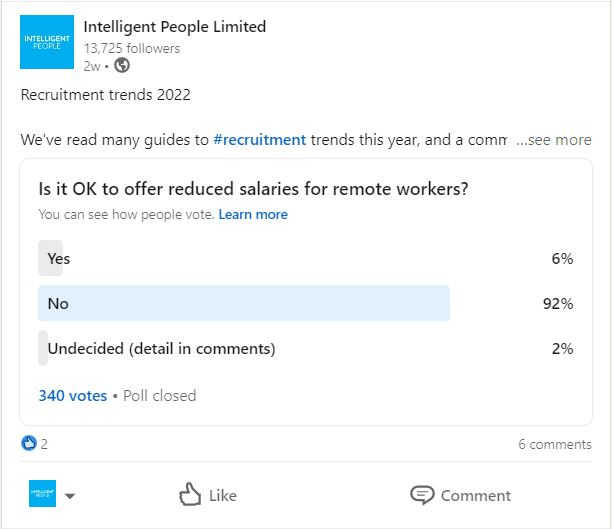In the last few years, recruitment processes and hiring strategies have had to change. Ways of working, employee expectations, candidate expectations and ways to retain staff have all changed into a ‘new normal’ and it looks like the change is here to stay.
Key recruitment trends in 2022 relating to remote working
- ‘The Great Resignation.’ The industry term has evolved from data showing that many employees are quitting their jobs or quitting work entirely. What has fuelled this change? Since the pandemic, people have evaluated their lifestyles, what is important to them, and how much they enjoy work. Employee expectations are now much higher than pre-pandemic, with workers suggesting they are no longer willing to work at a role that they are unhappy in, or where there is a bad culture
- Hybrid and remote working. According to the ONS, 85% of working adults in the UK want to use a ‘hybrid’ approach in future. We can see this reflected in the jobs we advertise – our clients only advertise vacancies as either hybrid or remote. Otherwise it is extremely challenging in this candidate driven market to attract quality applicants to the role. The ONS backs this up with figures where ‘online job adverts including terms related to “homeworking” have increased at a faster rate than total adverts’ – as much as 3x more. Employees want hybrid or remote opportunities to support their work-life balance
- A recent survey by Ernst & Young Global reported that 9/10 employees want flexibility in where and when they work. 54% would choose flexibility in when they work, with 40% wanting flexibility in where they work. On average, employees would want to work between two and three days remotely after the pandemic
- There is growing noise about other measures to improve work-life balance and the flexible working trends including moving to a 4 day work week, with up to 70 businesses in the UK now trialling this. The main objective of this is to allow employees to have live a happier and more fulfilled life.
- This shift towards remote working is also here to stay within recruitment and hiring processes. It makes sense that whilst interviewing for a remote role, the candidate expects a remote recruitment process. This also has benefits for the employer: efficiency, quicker hiring processes, flexibility, access to a wider geographical pool of candidates, all whilst testing out how the candidate communicates and works remotely
Remote working and salary expectations
We’ve recently conducted a LinkedIn poll to answer the question ‘Is it OK to offer reduced salaries for remote workers?’
The result? 92% answered no.

Is it OK to offer lower salaries to those working remotely?
Answer: no
- If you can carry out the same role remotely as you can whilst in the office, there should be no impact on the salary offered
- Working remotely means that some employers actually work longer hours, because they don’t have the time pressure of commuting
- Remote working actually increases productivity without the distractions of an office environment. Remote working means less meetings, quicker meetings and more time for tasks
- Employees working remotely are likely to be happier in their job role. Happy employees = highly motivated, engaged employees with increased productivity and better results
- Offering reduced salaries in the candidate driven market will mean that businesses will find it harder to fill roles, with a longer lead time. This impacts business performance in both the short and long term
- Offering lower salaries for remote workers will decrease retention. Employees will simply shop around for a remote role that has a competitive and full salary. In a current market where candidates have the pick of the market, employers should be devising strategies to improve retention rather than decrease
- Remote employees actually save the business money. There is no associated office costs like electricity, stationary supplies, substance etc
Answer: yes
- Offering reduced salaries for remote working will encourage more people to return to the office full-time
- Office working improves employee communication and collaboration. Better communication and collaboration leads to better results
- It’s ok to offer reduced salary to remote workers if their location is in an area of lower cost of living than the office location
- Employees do not need to pay travel costs so they can afford a reduction in salary
- It’s harder to keep track of an employees performance if they work remotely – there is less visibility on their workload and so offering a reduced salary, reduces the risk for businesses
Summary
Regardless of your answer to our poll question, ‘Is it ok to offer a reduced salary to remote workers’, the answer from the majority of the employees out there is ‘no’. Bearing this in mind, it is important for employers to consider these stats from a hiring and retention perspective and therefore whether to implement this remuneration strategy into your business.
If you require any further support on your hiring processes or would like to understand more about the current market and employee expectations, reach out to us today. We can also help you hire within the marketing, product management, eCommerce and commercial leadership field.




